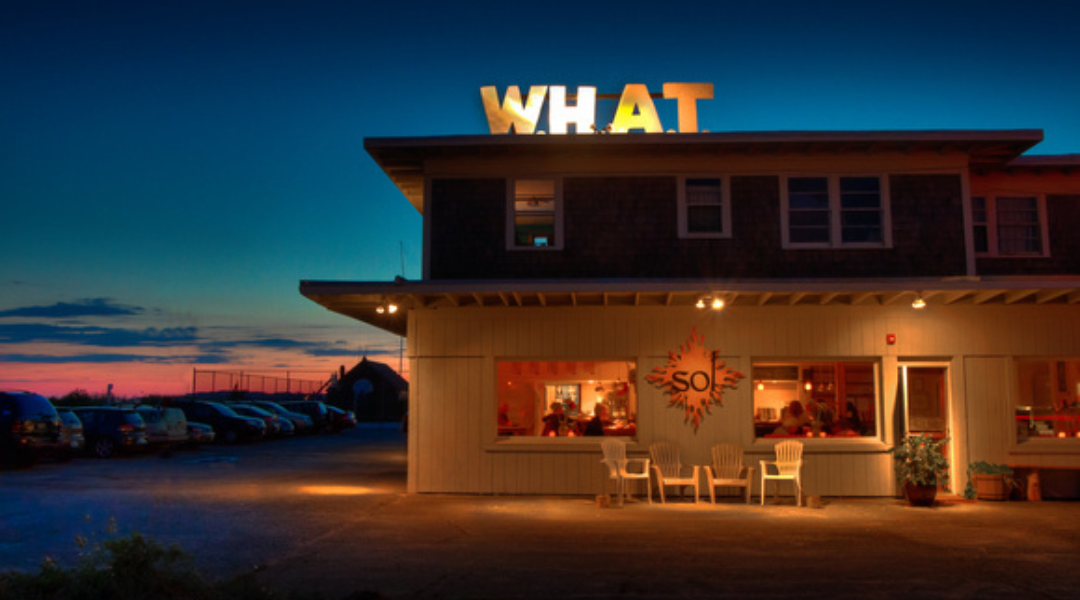
A Heavenly Return: “Angels in America, Part II: Perestroika” at the Provincetown Theater

There is, it turns out, a formula for stage magic: ten impressive actors, an indescribable set design, a brilliant time-tested script, and an inspired director. That’s what you’ll see at the Provincetown Theater’s production of Angels in America, Part II: Perestroika—nothing less than stage magic. Few shows can capture an audience as it does, with its convoluted layout and semi-controversial plot and a call to memory that’s close to transcendent.
The consensus of critics has been that this second part of Angels is less appealing than the first part, due to longer speeches, more emphasis on the supernatural, and an unfortunate opening monologue by The World’s Oldest Bolshevik (who in this production, it has to be said, was difficult to understand). I have to disagree. Despite those challenges, this Perestroika has powerful impact. It’s darker and more mystical than Millenium Approaches, which appeals to me, and while it stages the same characters, they have all clearly evolved.
The multi-layered stage (more on that later) echoes the layers of the production. On one level, the play is set in New York City in the mid-1980s and tells the story of Louis Ironson (Karl Gregory) and his boyfriend Prior Walter (Todd Flaherty). Prior is dying of AIDS, and Louis abandons him to have an affair with Joe Pitt (Nick Wilson), a closeted Mormon attorney married to Harper Pitt (Danica Jensen). When Joe comes out to his mother Hannah Pitt (Laura Scribner), she sells her home in Salt Lake City and moves to New York, where she becomes a volunteer at the Mormon Visitor Center. Louis and Prior’s drag queen and nurse friend Belize (Devon Kendall-Jacobs), who is caring for Prior in the hospital, is also assigned to provide nursing care to the notorious and closeted Roy Cohn (Joe MacDougall), dying of AIDS in the same hospital. When Louis learns that his lover Joe is Cohn’s protégé, he breaks off the relationship and attempts to reunite with Prior.
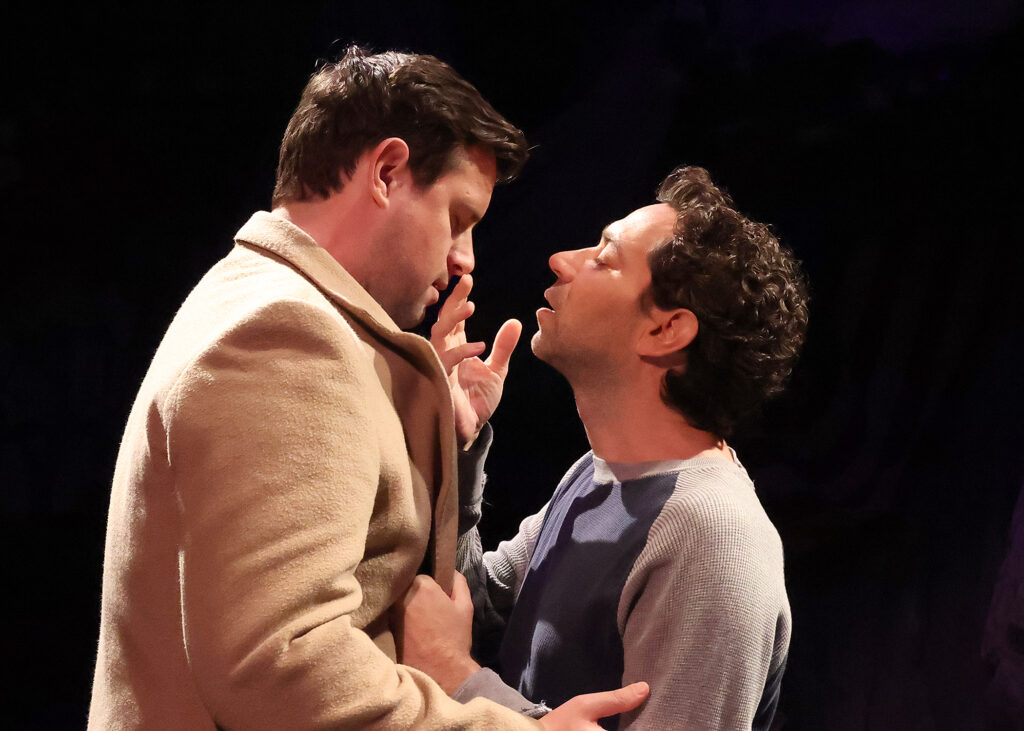
Meanwhile, however, on another level, the play is set in some version of heaven (rumored to resemble a utopian gay-friendly San Francisco). Prior’s disease-driven delirium features an Angel (Darlene Van Alstyne), propelled seamlessly by Europa (Sean Flyer) and Oceana (Tim Maher). And “seeing things” isn’t limited to the celestial sphere: Harper’s tranquilizer-induced hallucinations include visitations by Mr. Lies, an imaginary travel agent, while Roy Cohn’s dying delusions involve the appearance of a spectral Ethel Rosenberg.
Kushner’s script includes the AIDS epidemic, the Mormon Visitors Center, Jewish mysticism, one of the slimiest lawyers who ever lived, heaven, family relationships, love, death… pretty much everything but the kitchen sink.
That crowding of themes is reflected brilliantly in David Drake’s production first and most viscerally through the set, designed by Jenni Baldwin and Shannon Robert. To call it maximalist would be to grossly understate the richly textured evocative scenery. Unidentified objects are wrapped in sparkling, translucent, and occasionally cobwebby fabric, a jumble of ethereal and pedestrian artifacts that underscores the two dimensions of heavenly and earthly interactions. The design provides incredible flexibility for staging, with grottoes, staircases, platforms, and more; and the actors use all of it to perfect effect.
The same actors have all reprised their roles from last year’s production of Millenium, and for the most part seem to have evolved each one almost organically. I liked Jensen’s emotionally distanced performance before; she’s brought it to a new level here, floating around the stage in a haze of painkillers and madness. Gregory’s Louis is sharp and fairly bursting with a certain coiled energy I don’t remember from Millenium. And Flaherty infuses Prior with a rainbow spectrum of emotions as he moves through his acceptance of both his disease and his unexpected window into heaven.
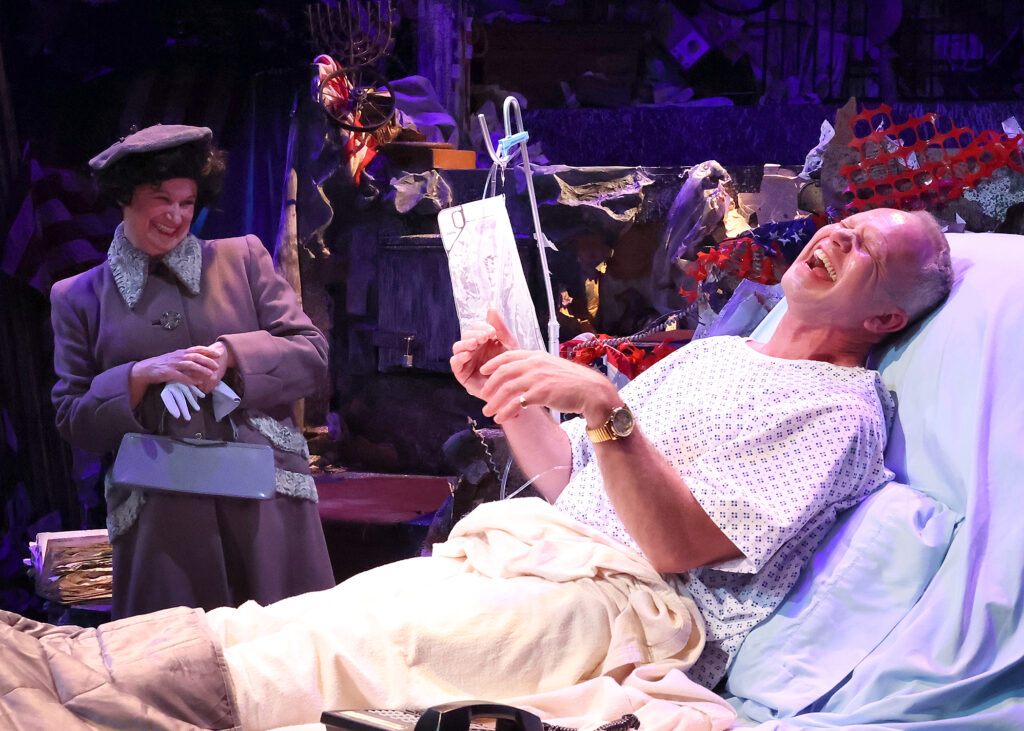
Belize has possibly the best line in the play, saying to Louis: “The white cracker who wrote the national anthem knew what he was doing. He set the word ‘free’ to a note so high nobody can reach it. That was deliberate. Nothing on earth sounds less like freedom to me.” Kendall-Jacobs delivers it flawlessly, and it reminded me of how much of this play is touched with a sort of sad humor. I’d forgotten that. Another smile came when one of the characters—I can’t remember which—spoke of an “ideological leather bar.” That’s hard to top.
The Roy Cohn character, unfortunately, continues to disappoint in its one-dimensionality, which has to be Kushner’s take on the real public figure; it’s possible that there was, in fact, no there, there. With his blustering, simplistic, ego-driven persona, it’s easy to see where the current president learned how to be boorish, but it stands in stark contrast to the other characters’ layered dimensions. MacDougall does what he can with the role, but it’s difficult to see Kushner’s Cohn as anything but a crude caricature.
When Perestroika made its début, Cohn had only been dead for six years, so the original audiences all knew about, in Louis’ words, “the damage he’s done, the years and years of criminality.” And the opening monologue makes less audience connection now than when the play was new, right after the dissolution of the Soviet Union. Perhaps younger audience members will be moved to learn about a time in America’s history that has perhaps presaged our own.
One aspect of the play that stood out to me this year as being particularly à propos was personal: I am Catholic, and opening night coincided with the election of a new pope. Perhaps that’s why I was hyper-aware of Hannah’s inner journey, which Kushner handles with a special sensitivity. He pushes her religious character to evolve and learn, which she does though coming to befriend the LGBTQ+ community. Kushner challenges religion, showing the pain and oppression it can exert upon various communities, but also showing its comfort and beauty and ability to grow, to evolve, and to change.
One scene I found particularly poignant is when Roy Cohn finally dies, the ghost of Ethel Rosenberg urges Louis to recite the Mourner’s Kaddish for Cohn. He refuses, then hesitantly searches his memory for the forgotten words; they finally say it together, mostly antiphonally. The grace and generosity of that moment is breathtaking.
Talking of religion, the presence of angels is neatly tied in with the biblical history of Bethesda and the Bethesda statue in Central Park while in stark contrast the AIDS epidemic metastasizes amidst governmental neglect. Kushner muses about history, politics, society, healthcare access for the privileged, religion, and values. It’s a tour around pretty much the gamut of human experience and emotions.
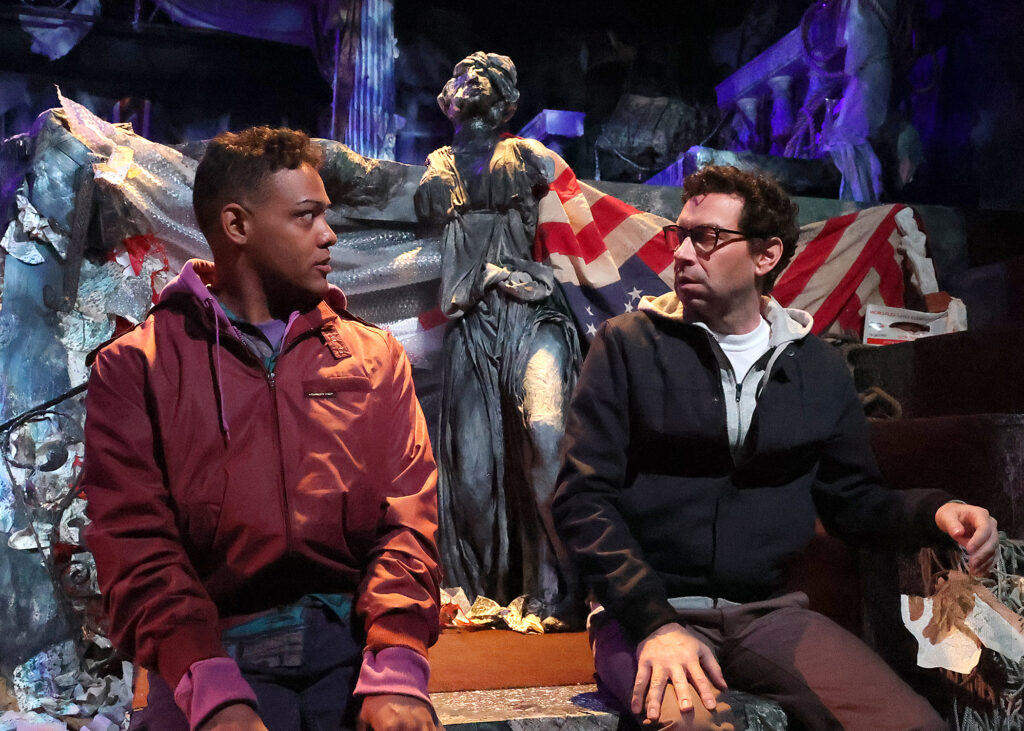
Drake’s direction is a large part of why this performance had audience members in tears and inspired them to give a rousing standing ovation with more shouts of “bravo!” than I think I’ve ever heard. He brings magic, freshness, and discovery to a play that is, let us not forget, three and three-quarters hours long—time that passes quickly thanks to his sense of timing. (The audience is warned about the length, with Drake quipping, “And after that… we serve breakfast!)
The message of the play remains the problem posed by the World’s Oldest Bolshevik: “The great question before us is: can we change? In time?” Particulars have changed since the play’s era, but as we’ve unfortunately seen recently, the work is now more important than ever. Reagan and AIDS are now Covid-19 and Trump, and we need both the commitment and compassion we were able to muster in the 1980s if we want to have any hope for the future.
Go see Perestroika. It will inspire you to continue in the fight.
***
Angels in America, Part II: Perestoika
May 8-25, Thursdays – Saturdays at 7pm, Sundays at 2pm.
***
review: Jeannette de Beauvoir
photos: Bob Tucker/Focalpoint
***
More Recent Provincetown News

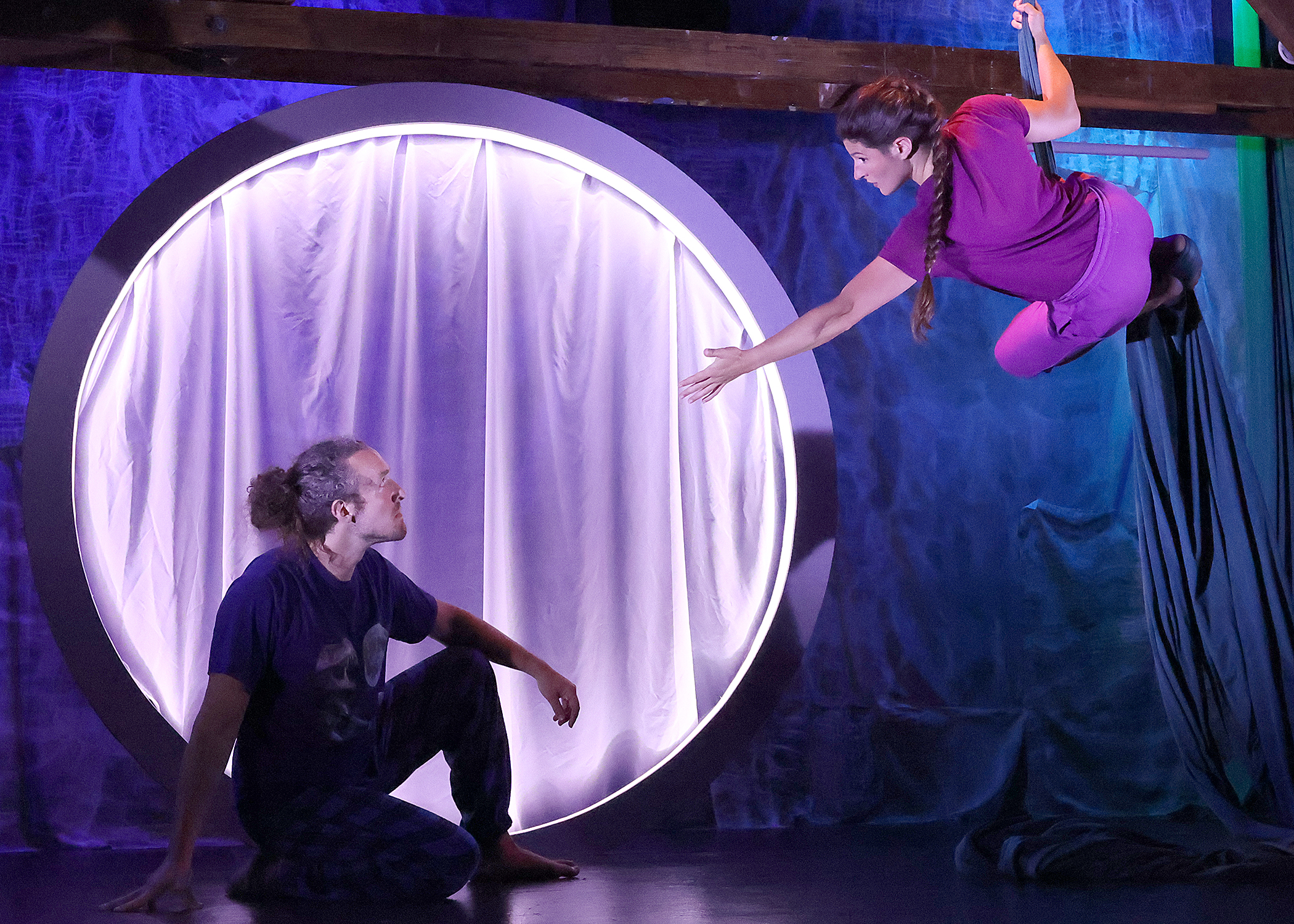


 Accommodations
Accommodations  Art
Art  Bars
Bars  Books
Books  Entertainment
Entertainment  Events
Events  Featured
Featured  Guides
Guides  History
History  Literary stuff
Literary stuff  Most Popular
Most Popular  Provincetown News
Provincetown News  Restaurants
Restaurants  Reviews
Reviews  Shopping
Shopping  Theatre
Theatre  Uncategorized
Uncategorized  Weed
Weed